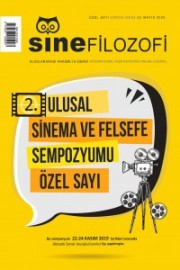Bir Mutlak Öteki Örneği: Leos Carax Sinemasında Mösyö Merde
An Example for Absolute Other: Monsieur Merde in Leos Carax Cinema
Author(s): Onur KeşaplıSubject(s): Contemporary Philosophy, Cultural Anthropology / Ethnology, Film / Cinema / Cinematography
Published by: Serdar Öztürk
Keywords: Leos Carax; Monsieur Merde; absolute other; evil; grotesque; other;
Summary/Abstract: The impact of culture and identity notions within social science studies increased, especially right after the end of the Cold War. This circumstance caused prominence for the word other and the act of othering. The common ground on this topic reveals that the other is a necessity in order to construct selfness. This leads to the thesis saying that without the other, there is no existence. As for Baudrillard, who describes the era as the invention of the other, the word has been only valid for the West all along. At this point, the conclusion of the West deceiving its other, is an abstract, radical other. However, apart from the other which lost its tangibility, there are groups that are coded as other without basing on culture, identity nor disposition. In these particular groups, which can be conceptualized regardless of time and region as the Absolute Other, there are people with mental illnesses, with deformed bodies, having weight problems, and in general, whoever has different type of appearance beyond ordinary and common outlooks. In all over the world, the Absolute Others differs with their looks and actions from everyone. In the oneiromancy of the Absolute Other, which becomes concrete with evil actions and ugly complexions, the Notion of grotesque is prominent when it comes to out looks and the Notion evilness is featured as a mindset, especially the way as Bataille describes. Classic definitions for the other and the examples of othering are more often seen in cinema. But it is not valid for the Absolute Other. In the history of cinema, very few films that include examples of the Absolute Other, except from the ones commonly using grotesque appearances in order to demand tolerance, were mostly fulfilled in recent years. Character of Monsieur Merde, appearing in two films directed by Leos Carax, who always showcased extreme characters and figures throughout his career, is an essential example for the Absolute Other with his grotesque evilness. As seen in Tokyo in Merde segment of the film Tokyo!, and in Paris in the film Holy Motors, Monsieur Merde becomes an Absolute Other flaneur as he clashes with contemporary and modern norms of the civilization.
Journal: SineFilozofi
- Issue Year: 5/2020
- Issue No: Sp. Iss
- Page Range: 40-62
- Page Count: 23
- Language: Turkish

